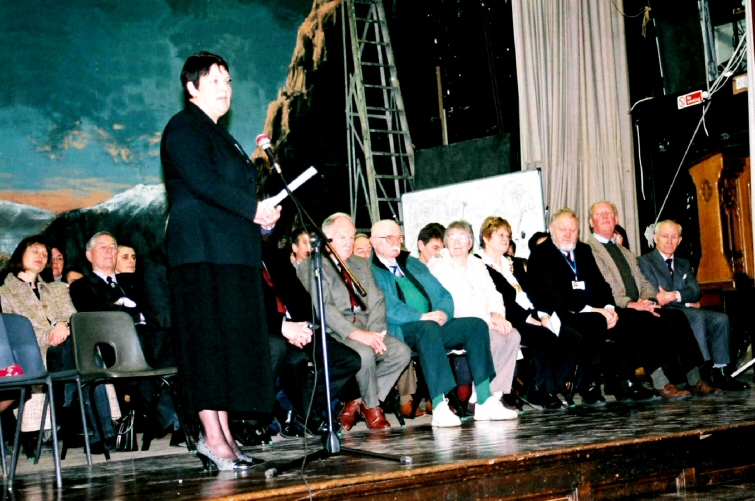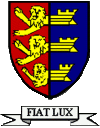
Photo by kind permission of Karen Steel.
Mrs. Sally Lees Centenary Speech
“Very warm welcome to everyone on this special day.
This is the opening of our Centenary year; first of many events during the course of the year in which we will be celebrating this important milestone in the history of our school.
Opportunity to look back and celebrate 100 years of proud tradition; 100 years of providing a quality education to the boys of Dover and the surrounding area; 100 years of supporting and caring for 1000s of boys as they make their way through the challenging path of adolescence and developing maturity; 100 years of nurturing and developing essential skills for the country’s future leaders; 100 years of providing well educated, confident young men who can take their place in key positions in the professions, in politics, industry, commerce, the armed services; all dedicated to serving others in this country and all over the world.
I find myself in the privileged position of leading this excellent school into its second century. The responsibility is a weighty one. I follow a succession of influential Headteachers who have taken DGSB to their heart, committed years of their life to its development, and taken it forward through sometimes very difficult circumstances. This is a school which has survived some serious threats to its existence, and previous Headteachers have fought hard to preserve the school and to continually prepare it to face the challenges ahead. I also believe in this school, and I will do all I can to ensure that it provides the quality education which will prepare its students for life in the 21st century.
In some ways, this second century in the life of DGSB will be very different from the first. In 1905, when Mr Fred Whitehouse became the first Headmaster of Dover County School, there were no such things as computers; in 2005, computer literacy amongst the workforce is assumed, and DGSB must provide for all its students to be confident in the most cutting edge technology. In 1905, business education would not have played any part in the curriculum; in 2005, all our students must be prepared for the world of work, and indeed the school is looking to become a Business and Enterprise Specialist school this year. 100 years ago, who would have thought that Media Studies, Government and politics and Psychology would be amongst the most popular subjects studied in the 6th form? But in 2005, these subjects run confidently alongside the traditional subjects of Maths, English, Science and Latin. And the student voice is now a powerful one – I wonder if Mr Whitehouse, Mr Booth, Dr Hinton, Mr Colman or Mr Slater were interviewed by students before being appointed Headteacher of DGSB? I am proud of the fact that the students did have input into my appointment and into that of Mr Pullen, the Deputy Headteacher. The student council in the 21st century has a strong voice and the opportunity to influence important decisions in the life of the school in a way unimaginable in 1905.
And yet, there are some ways in which the second century in the life of DGSB will be very similar to the first. The emphasis on community values will continue; as will the emphasis on the development of the whole person the personal qualities as well as the academic qualifications needed to make the most of life’s opportunities; DGSB will continue to be committed to high academic achievement for its students; DGSB will continue to provide high quality teaching and learning experiences; DGSB will continue to provide opportunities outside the classroom in sport, music, CCF and other activities to extend the range of experiences for students; DGSB will continue to nurture mutual respect for one another; DGSB will continue to prepare confident young men who can lead the country into its future.
So at the start of 2005, we look back and celebrate 100 years of achievement: those 100 years include times of good fortune, times of sadness, times of celebration, times of threat to the future of the school, times of confidence in the future. And as we look back in gratitude to the staff and students who have given so much in the past, we also look forward with optimism and enthusiasm to the future.
We will shortly be moving outside to witness the raising of the flag. When we get outside, perhaps you might take a moment or two to look around you. If you look down, and you will see the evidence of a major programme of refurbishment which has begun; this will bring these wonderful historic buildings back to a proper state of repair, and will provide facilities appropriate to a 21st century school. Look across to the harbour; Europe beckons, with all the opportunities that brings to us here in prime position in Dover to benefit from links with our European business partners. When you hear the fanfare, look up to the top of our tower. You will see our new flag being raised. This flag has been newly designed and commissioned, and it has been sponsored by our parents and our Old Pharosians. It will be raised every day of our Centenary year and it will signify to all in Dover and beyond that Dover Grammar School for Boys is here, and is here to stay. It is a school taking its rightful place at the heart of the community; it is proud of its history and confident about its future.
When we move outside, guests and parents will gather on the cloister steps. The school will move to the Quad (Yrs 10 – 13) and the drive area by the top field (Years 7 9). When everyone is in position, the fanfare will announce the ceremonial raising of the flag. The fanfare has been specially composed for the occasion by Mr Brian Shaw, and will be played by Mr Shaw and Ben Reay. The flag will then be raised by the two youngest students in the school, George Revell and Chris Chattaway, ably assisted by the Head Prefect, Rahul Bakshi and Mr Peter Burville, one of our Old. Pharosians, who has been actively involved in the preparations for the Centenary.
After the flag is raised, the ceremony will be complete. Our visitors are invited to the Hall for refreshments, and our students will be dismissed by their teachers. They will go to break, and then to Period 3 at 11.00 a.m.”
